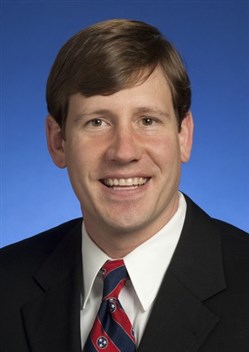VOL. 37 | NO. 7 | Friday, February 15, 2013
Time in D.C. helps shape Kelsey’s political philosophy
By Robert Sherborne

State Sen. Brian Kelsey
State Sen. Brian Kelsey (R-Memphis) came to politics young, specifically as a second-year law student.
Today, at age 35, he sits in a unique position, sponsoring not one but two amendments to the Tennessee Constitution that appear likely to pass the legislature.
If enacted, state and local income taxes on wages or payrolls would be specifically prohibited in Tennessee.
Additionally, the way justices are selected for the Tennessee Supreme Court, and all other appellate courts, would change. Under the new system, the governor would have the latitude to name whoever he wants, subject to a new confirmation process by both houses of the legislature.
The current nominating commission, which sends names to the governor, would be eliminated.
Kelsey, newly named chairman of the Senate Judiciary Committee, is shepherding the amendments, which both passed last session by the required two-thirds vote.
If they pass this session they will go to the public for a vote in 2014.
“I’m confident they will again receive a favorable vote,” Kelsey says, “but you never take anything for granted.”
Chances for legislative passage appear high since Republicans have a super majority of more than two-thirds in both houses.
Thinking big, as in changing the constitution, is nothing new for Kelsey, a seventh-generation Memphian who came to the legislature in 2009.
His first interest in politics was sparked at a YMCA youth legislature when he was in the eighth grade, he says.
As a student later studying economics, he adds, he came to firmly believe in free markets and limited government.
After going to Georgetown University Law School in Washington, D.C., Kelsey says he went to see his Republican congressman, Ed Bryant, to ask for an internship.
Senator Brian Kelsey, (R) Memphis
Represents: District 31, which is in east-central Shelby County (Memphis) and includes Germantown
First served in the General Assembly: 2004
Personal: Senator Kelsey attends Fellowship Memphis Church and is an attorney
Contact: 615-741-3036 or [email protected]
Bryant turned him down. The congressman suggested Kelsey needed to focus on his studies, not politics, Kelsey says with a laugh. But the next year, Kelsey asked again and Bryant gave him an internship.
Subsequently, Kelsey went to work for Bill Frist, then the U.S. Senate majority leader, and for the White House Counsel’s office under Pres. George W. Bush.
Kelsey decided to run for the legislature in 2004 and won a House seat from Memphis. Five years later, he won his Senate seat in a special election.
Looking ahead to this legislative session, Kelsey says, he sees a couple of big issues looming.
One is school vouchers, which would allow students to attend the school of their choice.
“Education is the key to reducing the poverty rate,” Kelsey says, “and it’s simply unjust to be sending kids to schools based on their zip code. Every child deserves opportunity.”
And while vouchers have been criticized as reducing funding for public education, Kelsey sees them differently.
“In every state where they’ve been tried, students’ scores have increased,” he says. So, too, have graduation rates. And, he says, studies have shown that vouchers can actually increase funding for public education because the schools parents select for their children are often less expensive to attend than the public schools.
Money also is key to a second big issue Kelsey sees coming, whether to expand the state’s Medicaid program as detailed in the Patient Protection and Affordable Care Act – or Obamacare.
Kelsey opposes an expansion and has introduced legislation to stop it.
“Tennessee simply cannot afford it,” he says.
The federal government will initially pay 100 percent of the expansion cost, but that is later reduced to 90 percent.
Then, Kelsey says, the cost to Tennessee taxpayers will be “at least $200 million a year.’’
Moreover, Kelsey adds, he suspects the federal government will not keep its promise to continue funding 90 percent of the expansion cost, adding:
“I don’t want to be in the position to cut people” from Medicaid.
Several Tennessee hospitals have indicated their survival may be threatened without the expanded Medicaid program, when coupled with other provisions of Obamacare.
But, Kelsey says: “My responsibility is to the Tennessee taxpayer.”